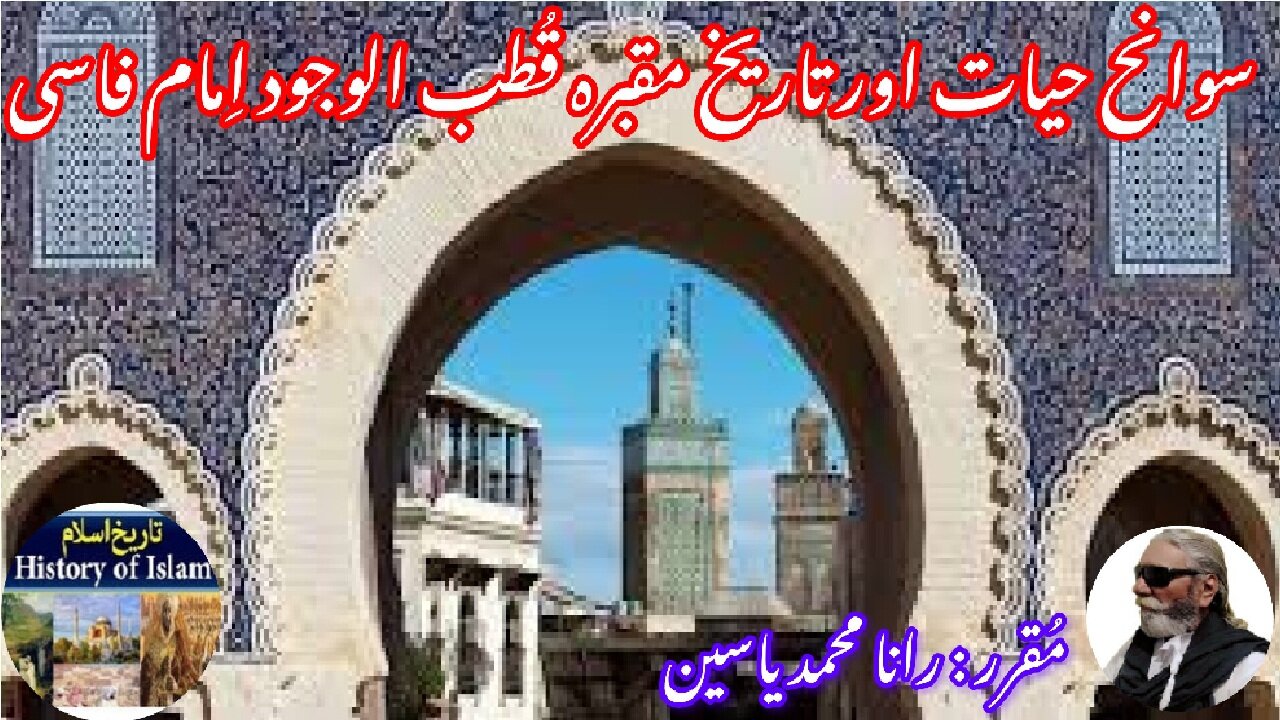Premium Only Content

Scholar Qutbul Ujud Imam Fassi | قطب الوجود امام فاسی کی سوانح عمری اور ان کے مزار کی تاریخ
@islamichistory813 #sufisaint #culturalheritage #biography #qutbulujudimamfassi #muhammadbinmuhammadalfassi #islamicmysticism #islamicphilosophy #shrine #historicalfigures
Biography of Muhammad bin Muhammad al-Fassi (commonly known as Qutbul Ujud Imam Fassi) and the history of his shrine
Dekhti Aankhooon aur sountay kaanoon ko Asslamoalaikum, sisters, brothers friends and elders, in informative series videos of Islamic ascolars, sufisaints, cultural heritages, islamic philosophys, islamic mysticisms and historical figures. today we are describing biography of Muhammad bin Muhammad al-Fassi (commonly known as Qutbul Ujud Imam Fassi) and the history of his shrine.
Muhammad bin Muhammad al-Fassi (commonly known as Qutbul Ujud Imam Fassi) was the originator of the Fassi family of Sheikhs who constitute the Fassiyatush Shadhiliyya Sufi order.
Fassi was born either in the year 1173 Hijri (ca 1760 CE) or 1218 Hijri in Fes in Morocco, from which the family name "al-Fassi" had earlier been derived. His mother died during his very childhood. He was a hafiz al-Quran during his childhood and travelled to various parts of the world and finally Makkah in search of wisdom.
Imam Fassi can be briefly referred to as Qutbul Ujud or Qutbul Ujud Hazrat Fassi.Some of the full versions of his name include Qutbur Rabbani, Haikalus Samadhani, Qutbul ujood, Abu Abdullah Seiyaduna Muhammad bin Muhammad bin Masood bin Abdur Rahman al-Makki al-Hasani al-Idrissi al-Fassi ash-Shadhili (Rali.) or Hazrat Qutbul Ujud Seyyidina Mohammad al-Fassy ash-Shadhili (Rah...)
Imam Fassi travelled to Mecca to memorise and learn the Quran with tajwid. He travelled to many places in search of good preachers. His main sheikh was Sidi al-Sheikh Muhammad bin Hamzah al-Madani(Sheikh Qutb Mohammad bin Hamza lafir al-Madani
Muhammad bin Muhammad al-Fassi, commonly known as Qutbul Ujud Imam Fassi, was a renowned scholar, Sufi, and spiritual leader hailing from the city of Fes (Fez), Morocco. His full name reflects his esteemed position in Islamic mysticism, and the title "Qutbul Ujud" signifies his role as a spiritual guide and an important figure within the Sufi tradition. He is celebrated for his profound contributions to Islamic philosophy, theology, and Sufism, especially for his understanding of unity of being (wahdat al-wujud) and his interpretation of divine love.
Imam Fassi was born in Fes, a city that has been a hub of Islamic learning, culture, and spirituality since the 9th century. Fes was historically one of the major centers of the Islamic world, known for its intellectual and religious significance. During his lifetime, Fes was a city deeply influenced by Sufi traditions, and Imam Fassi played a crucial role in shaping the spiritual landscape of Morocco and beyond. His teachings focused on the inner dimensions of faith, emphasizing the importance of personal experience with the Divine, the pursuit of knowledge, and the cultivation of virtues such as humility and compassion.
Imam Fassi is particularly recognized for his leadership in the Qadiriyya Sufi order, where he became an influential guide to many followers. His works, teachings, and personal piety left a lasting legacy, influencing generations of Sufis and scholars in the Islamic world. The title "Qutbul Ujud" suggests his elevated status in the Sufi hierarchy, denoting him as a master of spiritual presence and an embodiment of divine unity.
Following his death, Imam Fassi was buried in the city of Fes, where his tomb has become a revered site for both religious pilgrims and those seeking spiritual guidance. The shrine of Qutbul Ujud Imam Fassi stands as a symbol of his spiritual and intellectual legacy. It is located in the renowned Moulay Idriss II Mausoleum, one of the most significant historical and religious sites in Fes. The mausoleum itself is a place of great religious importance, housing the tombs of many prominent figures, including the founder of the city, Moulay Idriss I.
The shrine of Imam Fassi attracts visitors and devotees who seek to honor his memory and reflect on his teachings. The site is particularly frequented by those who are devoted to Sufi mysticism, and it remains a center of worship, reflection, and spiritual gathering. Imam Fassi’s tomb continues to be a place where people come to seek blessings, offer prayers, and learn from his enduring wisdom, making it a cherished part of Morocco’s religious and cultural heritage.
With this, we seek your permission until tomorrow, tomorrow we will describe the biography of Shah Abdullah alias Shah Ghulam Ali Dehlavi and the history of his maqbara. Allah Hafiz.
================================
-
 LIVE
LIVE
Vigilant News Network
4 hours agoUK Government BUSTED in Secret Plot to Extract Your Data | Media Blackout
1,058 watching -
 1:03:32
1:03:32
Winston Marshall
3 days ago"War On Children!" The DEMISE Of The West Starts With Schools - Katharine Birbalsingh
55.7K51 -
 48:02
48:02
Survive History
7 hours agoCould You Survive as a Sharpshooter in the Napoleonic Wars?
129 -
 12:03
12:03
Space Ice
8 hours agoSteven Seagal's China Salesman - Mike Tyson Knocks Him Out - Worst Movie Ever
99012 -
 11:37
11:37
Degenerate Jay
7 hours agoJames Bond Needs Quality Over Quantity From Amazon
302 -
 15:23
15:23
Misha Petrov
7 hours agoTrad Wives & Girl Bosses Go to WAR!
1.76K23 -
 2:03:11
2:03:11
TheDozenPodcast
6 hours agoFootball villain fighting the state: Joey Barton
55 -
 LIVE
LIVE
Scottish Viking Gaming
8 hours ago💚Rumble :|: Sunday Funday :|: Smash the Blerps and Vape the Terpes
1,040 watching -
 1:45:00
1:45:00
RG_GerkClan
10 hours ago🔴LIVE Sunday Special - It's Time for World Domination - Civilization VII - Gerk Clan
49.1K22 -
 LIVE
LIVE
Major League Fishing
4 days agoLIVE Tackle Warehouse Invitationals, Stop 1, Day 3
161 watching